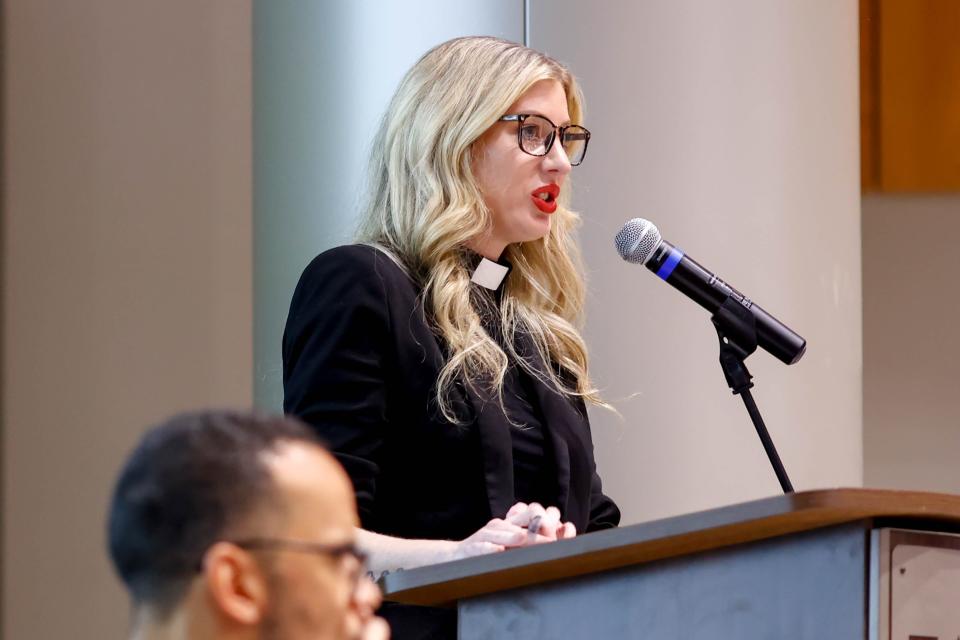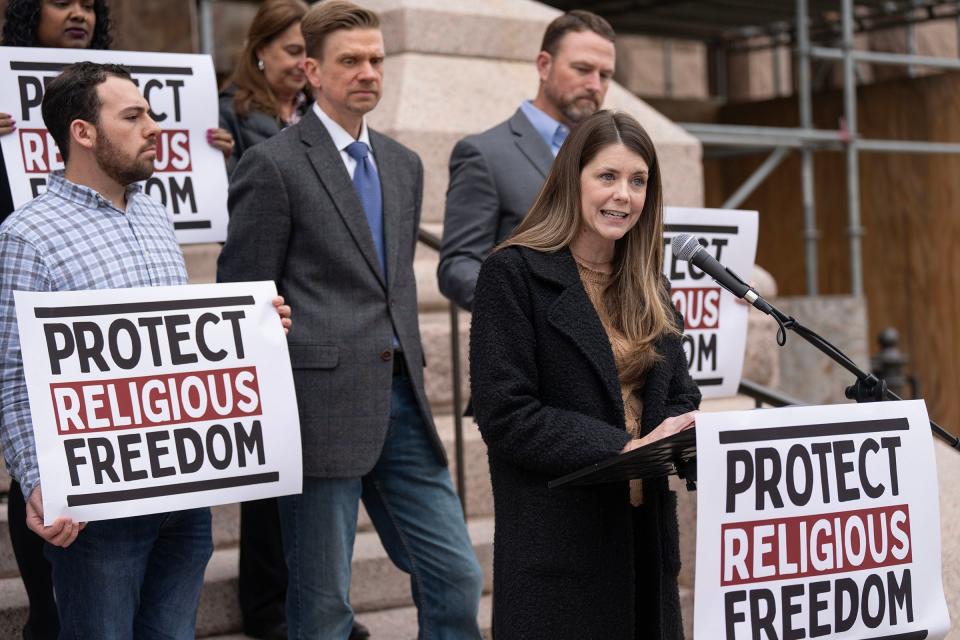Bills to hire chaplains for public schools dead for now, but critics remain vigilant
Proposed legislation that would allow Oklahoma public schools to hire faith-based chaplains did not make it out of committee, meaning it is unlikely to move forward during the 2024 legislative session.
But critics of three chaplaincy bills said they remain vigilant because the language in the measures could be incorporated into other proposed legislation.
The bills in the spotlight include House Bill 3122, authored by Rep. Danny Williams, R-Seminole; House Bill 3543, authored by Sherrie Conley, R-Newcastle; and Senate Bill 1984, authored by Sen. Shane Jett, R-Shawnee. Authorization for public schools to hire chaplains or accept chaplains as volunteers to "provide support, services and programs for students" is just one part of the multi-pronged "Oklahoma Freedom of Religious Expression Act" bills authored by Williams and Conley. Jett's bill, which is more singular in focus, would allow a school district to contract with a chaplain to perform the duties of a school counselor.
"For now, we're happy that those were not heard in committee, but we will continue to watch because it's normal for these things to resurrect throughout session," said the Rev. Shannon Fleck, executive director of the Oklahoma Faith Committee.
The bills' authors could not be reached for comment. Johnny Davis, chief development officer with the Norman-based National School Chaplain Association, expressed dissatisfaction with the bills' apparent demise.
"I mean, we're in arguably one of the most conservative states in the country," Davis said. "We're in the middle of the Bible Belt and we can't get a chaplain bill, and you've got all these other states that are getting their chaplain bills."
Davis has said the National School Chaplain Association helped Texas legislators to successfully pass a chaplaincy bill in their state in 2023, and the organization also worked with at least one of the three Oklahoma legislators attempting to get a similar bill passed in the state. The Christian chaplain association certifies chaplains by requiring them to go through an Oral Roberts University training program and pass safety training.
Davis said he will continue to emphasize that chaplains are already in many schools across the country on a volunteer basis, and they are also in other secular settings like the military and professional sports organizations. He said school chaplains do not violate the principle of separation of church and state in the Establishment Clause of the First Amendment because chaplains are spiritual care providers, not church representatives.
Bill to allow chaplains in public schools drew criticism from local and national groups
But organizations like the Oklahoma Faith Network and ACLU-Oklahoma have been watching the three bills that were introduced in the state Legislature because they do think the measures violate the principle of separation of church and state. Several members of the faith coalition said they were particularly concerned that the bills did not include certification requirements for chaplains and rules preventing chaplains from proselytizing or trying to get young people to accept a specific religious viewpoint. They also questioned whether public schools would be allowed to use public funds to hire chaplains.

In addition to criticism from Oklahoma organizations, the proposed bills also attracted interest from national groups like the Satanic Temple and the Freedom From Religion Foundation. Representatives of both groups said they are closely watching Oklahoma legislators' efforts to pass measures similar to one passed into law in 2023 in Texas, as well as others currently being considered by lawmakers in Florida, Georgia and other states.
Lucien Greaves, co-founder and spokesman of the Satanic Temple, said his organization is prepared to send its own chaplains into Oklahoma schools if any one or all the chaplain bills are passed into law. Greaves and others Satanic Temple leaders said concerns about a chaplain from the Satanic Temple potentially being allowed access to public school helped shape recent conversation surrounding Utah's proposed School Chaplaincy Bill and may have contributed to its defeat.
Greaves said he doesn't believe supporters of such bills when they say that faith-based chaplains won't proselytize in schools, and he sees these measures as "just another flagrant attempt at bringing a particular religious viewpoint into schools."
"I don't think they would care about the idea of our participation, if they were OK keeping proselytizing out of the equation ― it really wouldn't make a difference," Greaves said. "But with the bill sponsors, they keep saying that they just want an extra empathetic ear for the children, well, then they shouldn't care whether it's a Satanist or not in for that matter, they shouldn't care if it's a chaplain ― they could bypass all of this by simply asking for volunteers with counseling credentials, rather than chaplain credentials."
Ryan Jayne, senior policy counsel with the Freedom From Religion Foundation Action Fund, also expressed skepticism about the true motivation of chaplain bills.
"These chaplain bills are a terrible idea, and would give school districts the false impression that they are allowed to employ religious ministers to provide religious counsel to students, on campus during the school day. There is no way to make this practice constitutional at a public school," Jayne said.
He said if lawmakers are serious about trying to address the shortage of school counselors, they should work toward helping schools to employ more qualified, licensed counselors because inviting in religious ministers is unacceptable and will do far more harm than good.
Jayne said Georgia's Legislature recently amended a chaplain bill to specifically prohibit a Satanist from becoming a chaplain. He said in Georgia, like Oklahoma, it is clear that supporters of the proposed measures only envision chaplains of majority religions, specifically Christianity. But, Jayne said school districts cannot legally select preferred religions and exclude others.
"The fear of chaplains representing minority religions shows that proponents are dishonest when they say chaplains will not proselytize," he said.
"They know that chaplains are there to promote their personal religious views, and that's why they want to put Christian chaplains in public schools. The National School Chaplain Association, and its affiliated organization, Mission Generation Inc., have also made clear that their purpose is to exploit the shortage of school counselors in order to promote Christianity in public schools."

What's happening with Texas law?
Texas legislators sparked controversy when they passed Senate Bill 763 allowing public schools to hire unlicensed chaplains with safety funds. The measure was criticized because it did not include mandatory training requirements or define a chaplain's role in a manner that suited those in opposition of the measure.
In the last few weeks, the chaplaincy law has been at the center of ongoing debate because school districts across the state were given until the end of February to decide whether or not they would hire chaplains or accept them as volunteers.
The Baptist Joint Committee for Religious Liberty, Interfaith Alliance and Texas Impact, an interfaith grassroots network, sent the more than 1,200 independent school districts across Texas a letter signed by more than 100 Texas chaplains urging school leaders to reject the chaplain law.
The national organization also created an online tracker to show how 25 of the largest school districts in Texas voted on the chaplaincy issue as the deadline loomed. The Houston Independent School District, one of the largest independent school districts in Texas, along with the Dallas, Austin, Frisco and Fort Worth independent school districts, rejected the chaplain program.
Davis, with the National School Chaplain Association, said his organization already has been contacted by numerous independent school districts in Texas that did decide to create a chaplaincy program.
The Austin American-Statesman reported that various religious groups gathered on Feb. 29 at the Texas Capitol for a celebration surrounding those 25 school districts' decision to decline participation in the chaplain program.
"We are protecting our students and we are protecting our religious liberties at the local level across the state of Texas," Rep. James Talarico, D-Austin, said at a Feb. 29 news conference at the Texas Capitol. "We're happy to celebrate the victories here in Texas at the local level, but we've got to do so much more to resist Christian nationalism across the country."
This article originally appeared on Oklahoman: Oklahoma chaplain bills gone for now, but could still have impacts

